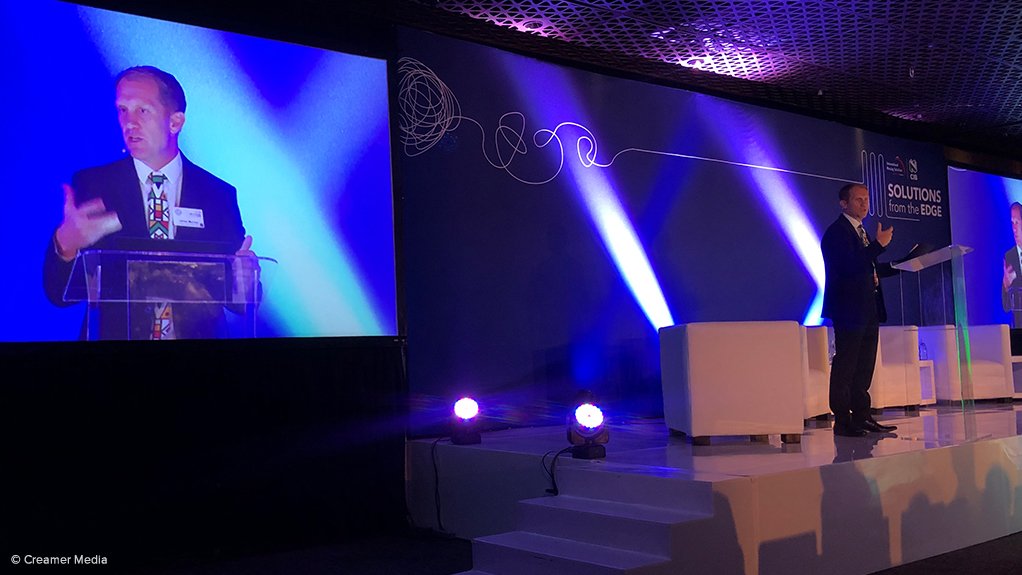Energy Council CEO sees 2023 as a turning point in the energy crisis, but warns of slow decarbonisation progress


Energy Council of South Africa CEO James Mackay
Photo by Creamer Media's Darren Parker
Industry body Energy Council of South Africa CEO James Mackay has said there is sufficient reason to believe that loadshedding could end as early as the end of 2024, but warns that South Africa is not on track to meet its decarbonisation targets.
Mackay was speaking at the Solutions From the Edge conference, hosted by housing financing organsiation International Housing Solutions and financial institution Nedbank Corporate and Investment Banking, in Johannesburg, on September 14.
“We are falling behind on our emissions reduction targets. We need to recognise this, and we need to ask: how will this hurt us – specifically when we think about our export-facing industries and global trade positions? What does it mean if we're not going to be able to decarbonise as quickly as what we've committed to?” he asked.
Meanwhile, Mackay said South Africans could expect to continue living under structural Stage 4 to 6 loadshedding until the end of this year.
“We're generally about two to three stages of loadshedding better than what we were in March and April. There is a lot more planned maintenance happening at the moment, specifically focused on technical interventions which are needed and long overdue. And not only technical intervention but also people intervention,” he pointed out.
Mackay said the country would be able to look back at 2023 as a crunch year and a turning point in the energy crisis. He said he was increasingly confident that the country was in possession of a good technical plan in the form of the Energy Action Plan launched by President Cyril Ramaphosa in 2022.
“Our biggest risk is going to be political will, especially going into very contested elections next year, to make quite hard decisions and very clear policy choices and commitments. Our biggest challenge is going to be the capacity to implement. I consciously call it a challenge because it's also a great opportunity to reindustrialise through clean technology, which will create gross domestic product investment and jobs,” Mackay said.
He pointed to three key factors that needed to be considered to continue pushing South Africa towards resolving its energy crisis.
First, Mackay said, South Africa had to keep rebuilding a well-functioning but reformed Eskom.
“We need Eskom. Critically, we've got to push for the unbundling. This would involve the establishment of a national transmission company and an independent market operator. These are all embedded in the Electricity Regulation Act Amendment Bill, which is now with Parliament."
He noted that the unbundling of Eskom had been on the cards for several years.
“The reality is that this is not from the Global North or climate change pressure. All the Brazil, Russia, India, China and South Africa, or Brics, economies have unbundled their energy utilities a long time ago.
"Almost all middle-income economies have done these reforms a long time ago. It just makes good sense. But we are still battling with it. We're still ideologically thinking about whether we should do it or not. We are becoming a laggard in the energy sector globally,” Mackay bemoaned.
He acknowledged that Eskom had suffered tremendous damage during the State capture period but said the company still remained a critical driver of reform, technical design and driver of market codes and reform.
Mackay also said it was important to acknowledge the work done, such as the grid expansion programme and the yearly Transmission Development Plan, which continue to be developed by Eskom.
“I do believe that they're doing some fantastic work at the moment, and they do still have some of our best technical and engineering skills. I think they are getting back on track, stabilising the organisation, and focusing on the right technical interventions at the power station level, as well as trying to keep pushing the reform agendas. So I'm confident that we'll see performance improving there,” he said.
The second factor for resolving South Africa's energy crisis was the need to embed the good progress that had been made in sector reform, in response to loadshedding, which he said had an upside, as it had forced much market liberalisation and accelerated private sector investment in renewables.
“However, we can't afford the private sector investment side to stall,” he said.
Third, Mackay said, South Africa had good technical plans.
“As South Africans, we've always had great technical plans and good ambitions, but implementation keeps escaping and failing us. I think that collaboration and commitment to partnering and partnerships are going to be fundamental to be able to double down on implementation,” he said, noting that the energy crisis had provided an opportunity.
Mackay noted that State capture and Covid-19 had left the country with quite deep economic and social deficits and very hollowed-out State capacity, not only at the State entity level but at departmental level and within all spheres of government.
“Then we can put on top of that what is arguably the biggest technology disruption in history: the energy transition. We can further accelerate that disruption through global climate change policy, with carbon border adjustment policies in countries such as the US and UK posing a real economic risk to South Africa,” he said.
However, Mackay noted that the energy transition was often framed as a response to climate change, which he firmly believed it was not.
He said the energy transition was about cost, referring to the levelised cost of energy, and the delivered energy return on investment.
“If you don't have to find the fuel, dig up the fuel, clean the fuel, move the fuel, burn the fuel in order to get to electricity, you're already doing two-thirds better just on efficiencies,” he stated.
He noted that solar and wind, because of the free feedstock, would always be cheaper and cleaner.
“However, it comes with a very different dynamic – it's variable, very distributed, very decentralised and very digitised. You have to think about energy as a system and how we will transition the system versus trying to pick a technology,” he said.
Mackay said fossil fuels would have to remain part of the energy mix for the foreseeable future.
“We will still need fossil fuels. I don't think there's really any views at the moment anywhere in the world that say we don't need hydrocarbons to run our economies. We're going to need them, but they are going to be more expensive, and we're going to have to pay the premium for them. And we're going to have to find innovative ways of cleaning up the emissions,” he explained.
However, Mackay said large-scale wind and solar remained the key to replacing aging and emissions-intensive coal-fired power generation.
“We will need about 56 GW of wind and solar on the system, with 8 GW of battery storage and about 5 GW of gas-to-power to ensure a stable energy system that will allow for the decommissioning of about a third of our coal-fired generation,” he said.
He said the council was starting to see a confident and consistent pipeline of projects, which was encouraging, with much investment creating enthusiasm and jobs.
“But it's only about half of where we need to be – particularly if we are to meet decarbonisation targets. We've probably underestimated the complexity and challenge of this energy transition, and we now need to reflect and adjust because implementation is what's key,” he said.
Mackay noted that the South African government had a good sense of what needed to be done, but that it was still struggling with a loss of skills and capacity, particularly at the middle supervisory and delivery level.
Comments
Press Office
Announcements
What's On
Subscribe to improve your user experience...
Option 1 (equivalent of R125 a month):
Receive a weekly copy of Creamer Media's Engineering News & Mining Weekly magazine
(print copy for those in South Africa and e-magazine for those outside of South Africa)
Receive daily email newsletters
Access to full search results
Access archive of magazine back copies
Access to Projects in Progress
Access to ONE Research Report of your choice in PDF format
Option 2 (equivalent of R375 a month):
All benefits from Option 1
PLUS
Access to Creamer Media's Research Channel Africa for ALL Research Reports, in PDF format, on various industrial and mining sectors
including Electricity; Water; Energy Transition; Hydrogen; Roads, Rail and Ports; Coal; Gold; Platinum; Battery Metals; etc.
Already a subscriber?
Forgotten your password?
Receive weekly copy of Creamer Media's Engineering News & Mining Weekly magazine (print copy for those in South Africa and e-magazine for those outside of South Africa)
➕
Recieve daily email newsletters
➕
Access to full search results
➕
Access archive of magazine back copies
➕
Access to Projects in Progress
➕
Access to ONE Research Report of your choice in PDF format
RESEARCH CHANNEL AFRICA
R4500 (equivalent of R375 a month)
SUBSCRIBEAll benefits from Option 1
➕
Access to Creamer Media's Research Channel Africa for ALL Research Reports on various industrial and mining sectors, in PDF format, including on:
Electricity
➕
Water
➕
Energy Transition
➕
Hydrogen
➕
Roads, Rail and Ports
➕
Coal
➕
Gold
➕
Platinum
➕
Battery Metals
➕
etc.
Receive all benefits from Option 1 or Option 2 delivered to numerous people at your company
➕
Multiple User names and Passwords for simultaneous log-ins
➕
Intranet integration access to all in your organisation


















